Are You An INFJ or an INFP? How to Find Out!
“Am I an INFP or an INFJ?” This is a question I get every day as an MBTI® practitioner and blogger. The reason this question comes up so frequently is because there are so many unreliable online tests out there. These knock-off personality quizzes claim to be as accurate as the official Myers-Briggs Type Indicator®, but they are lacking the reliability and validity testing that went into the official MBTI®. As a result, numerous people are being mistyped or getting different results each time they take the test. The most common mistype to come from these online tests is the INFP/INFJ mistype.
Table of contents
Estimated reading time: 10 minutes
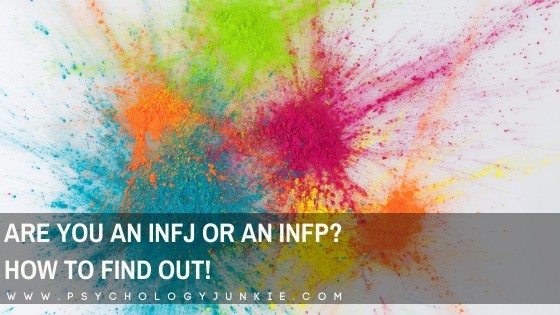
Take my INFJ or INFP Test! Scroll Down After Taking the Test to Read the Rest of the Article
Why are so many INFPs and INFJs mistyped?
The majority of online tests focus on the letter dichotomies (E or I, S or N, F or T) without considering the cognitive functions. Because of this, a very slight preference towards the P dichotomy or the J dichotomy could change your entire type. This isn’t how personality typing should work. INFJs and INFPs share zero cognitive functions. Plus, to make it even more confusing, INFJs lead with a perceiving preference, and INFPs lead with a judging preference. In turn, many INFPs type as INFJs and many INFJs type as INFPs! Are you confused yet? Let’s try to simplify things!
Let’s start by taking a look at the different cognitive functions for the INFJ and the INFP.
INFJ Functions
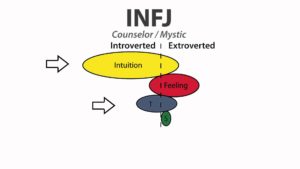
INFP Functions
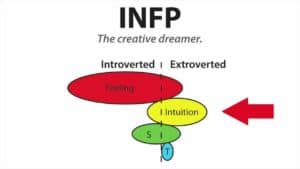
If you look closely, you can see that the INFJ uses introverted intuition (Ni), extraverted feeling (Fe), introverted thinking (Ti), and extraverted sensing (Se). The INFP uses introverted feeling (Fi), extraverted intuition (Ne), introverted sensing (Si), and extraverted thinking (Te). There is not one function that these two types share.
How can I tell if I’m an INFP or an INFJ?
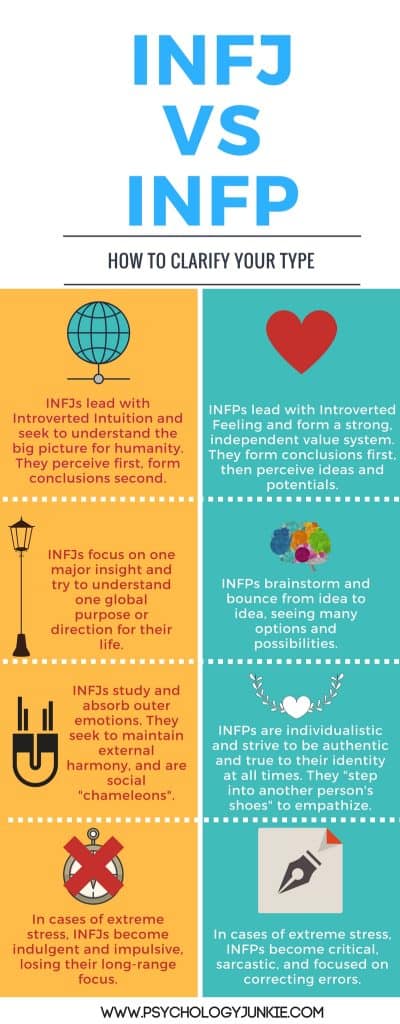
How INFPs and INFJs Use Intuition
INFJs lead with introverted intuition. This is their dominant function. Their #1 favorite driver. They use it so much that they probably don’t even realize they are using it. More than anything else in the world, INFJs are going to look at patterns, perspectives, and the big picture. They privately consider the purpose and meaning of life, and analyze human patterns and behaviors. They like to discard possibilities until they come to the one most likely possibility for the future. Their intuition is like a tall, narrow tree, with very deep roots. It has lots of depth, not as much breadth.
INFJs feel “detached” from the world, as if they are observing it from a distance. They “zoom out” of situations to try to see how the pieces fit into the big picture. It’s important for them to look at an idea from many angles and predict which idea has the most plausibility of becoming “real.” This is more natural to them than considering their feelings or values.
You can see the INFJ perspective of the overall meaning of things and the “big picture” in Dante Alighieri’s writings.
“Heaven wheels above you, displaying to you her eternal glories, and still your eyes are on the ground.”
INFPs do not lead with intuition. They lead with introverted feeling. Extraverted intuition is their 2nd favorite function and they enjoy using it but it’s not as automatic as feeling is. Extraverted intuition sees a multitude of ideas and possibilities in the external environment. Unlike the INFJ, who focuses on discarding possibilities until the right one is reached, an INFP adds MORE possibilities to the picture. They can see one thing and extrapolate numerous ideas and connections from that one thing. Brainstorming and bouncing from idea to idea is natural to them. Their intuition is like a tree with short roots but broad branches reaching out in many different directions. It has lots of breadth, and extrapolates many connections.
INFPs tend to feel different from the rest of the world. They have a strong individual set of morals, values, and ideals that they strive to live by. Being authentic and living in alignment with their moral-code is vital to their well-being. Their intuition gives them a creative outlook and an innate ability to see many possibilities and alternatives for the future.
You can see the INFP feeling of “difference” beautifully described by Edgar Allan Poe, who is an INFP.
“From childhood’s hour I have not been
As others were – I have not seen.
As others saw – I could not bring
My passions from a common spring.”
How INFJs and INFPs Use Feeling
INFJs use Extraverted Feeling. This is their 2nd favorite, or auxiliary function. It balances out their intuition. INFJs notice and absorb the moods and emotions of the people around them. They usually know how to alter their behavior to promote external harmony. The INFJs feeling function is like a tree with shallow roots, but long branches reaching out and absorbing emotions and feelings everywhere around it.
INFPs use Introverted Feeling. This is their favorite function, the one they use without having to try. INFPs constantly analyze how things fit in with their value system. They have a deep, individualistic set of values that they strive to adhere to in every aspect of their lives. INFPs are independent and seek to maintain an independent moral code that is refined more and more over time. They are constantly in check with their conscience to determine if something is “right” or “wrong”. They “step into other people’s shoes” to try to understand how they would feel in their position. This is called “mirroring” emotions. INFPs feelings are extremely deep, with a lot of focus. Their feeling function is like a tall tree with deep, long roots that refine and dig deeper into the INFPs own values, morals, and emotions.
INFPs will rarely alter their ideals or identity to “smooth over” things in the outer environment. Internal harmony and authenticity will always be more of a priority than external harmony.
INFJs Tertiary Introverted Thinking and INFPs Tertiary Introverted Sensing
INFJs will use tertiary introverted thinking to connect all their ideas in a way that makes sense to them. They strive for logical consistency and enjoy organizing thoughts in their mind and piecing together bits of information. Categorizing and sorting out information is often enjoyable for them – they enjoy understanding the principles and underlying framework for things. They also like to analyze the emotions and moods of other people so they can understand them better.
INFPs will use tertiary introverted sensing to ground all their ideas and processes with what they’ve experienced in their lives. INFPs have a certain nostalgic quality about them and like to remember what’s happened before and what they felt before. They use Si (introverted sensing) to recall numerous details about a past experience, how it made them feel, and what they learned from it. This gives them faith in their experience and an ability to remember things vividly. They often have favorite books, movies, and songs that they enjoy re-experiencing again and again. INFJs tend to have little cause for nostalgia and will usually pick a new book over re-reading a favorite.
INFJs use Introverted Thinking (Ti) as their “relief” function. During stress-free times, INFJs enjoy tinkering with ideas and principles. They enjoy doing brain-teasers and mental puzzles. They like to categorize and research.
INFPs use Introverted Sensing (Si) as their “relief” function. During stress-free times, they enjoy revisiting places they’ve been, ideas they’ve explored, or pulling information from the past or history. They can be very nostalgic and enjoy reminiscing about past experiences.
INFJs Inferior Extraverted Sensing and INFPs inferior Extraverted Thinking
The inferior function is the least developed of all the functions for each type. It’s also the most sensitive, and the most “at odds” with the dominant function.
INFJs have inferior Extraverted Sensing (Se). They are so often “in their heads” that they can lose touch with the world around them. They can also become very frustrated if the world around them is in a chaotic, disorderly state. When under intense stress, an INFJ might fall “into the grip” of extraverted sensing, and start over-indulging in sensory pleasures; over-eating, making impulsive decisions, drinking too much, over-exercising, being impulsive and reckless.
INFJs in a healthy mood can use Se in a positive way to enjoy a hobby that calms them; some INFJs become skilled gardeners, bakers, or they might enjoy bird watching or stargazing as a way to calm down and relax.
INFPs have inferior Extraverted Thinking (Te). Because it’s inferior, they can sometimes seem irrational because all their other functions tend to “crowd it out”. Just like INFJs can be so stuck in their heads that they can walk into walls (due to inferior Se), INFPs can be so occupied with their ideals and values that they lose their logical focus (due to inferior Te). Under extreme stress, INFPs can fall “into the grip” of inferior Te. This can make them seem overly directive, harshly critical, or sarcastic. They may become obsessed with righting wrongs or fixing errors.
INFPs in a healthy mood can use Te very effectively to bring their ideas and values to life and to give them a logical direction. Te can help them to put their ideas out into the world in a convincing, rational way.
In Conclusion…
I hope this helps you to understand the real differences between the INFP and INFJ! I also hope this helps you to figure out if you are one of these types. Let me know if this has been helpful, or if you have any problems with it! I’d love to talk it over in the comments! If you’d like to find out more about the INFJ personality type, check out my new ebook The INFJ – Understanding the Mystic.
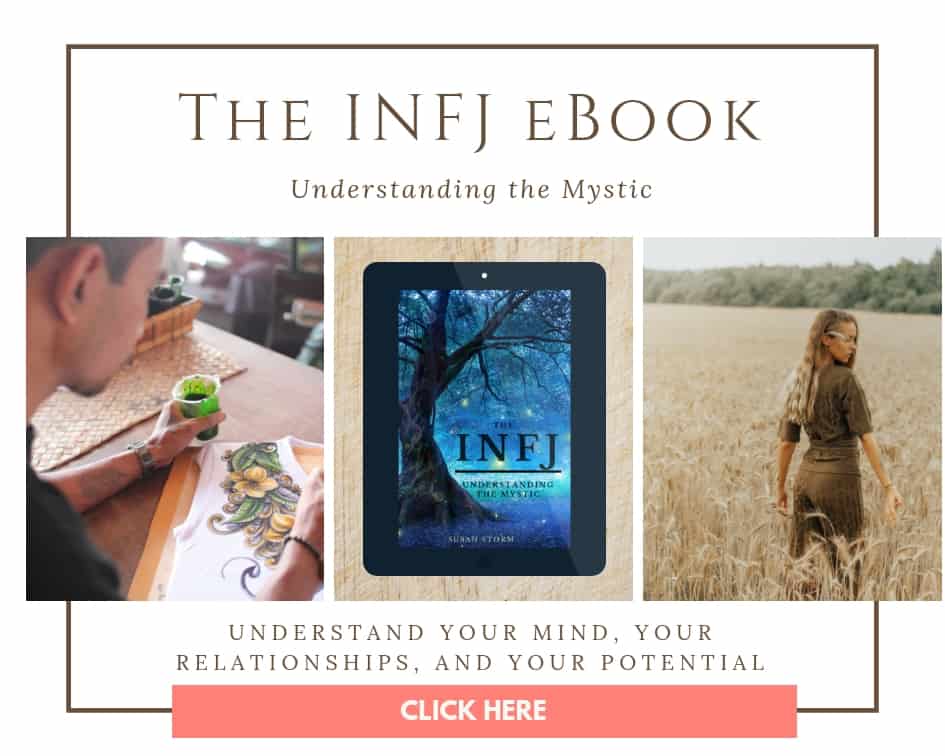
Sources:
There is a lot of helpful information about these two types if you are still seeking clarification. Check out these links!
Watch a Myers-Briggs Certified Master Practitioner discuss the difference between INFJs and INFPs!
My True Type: Clarifying Your Personality Type, Preferences & Functions
Please Understand Me II: Temperament, Character, Intelligence
The MBTI® Manual

Get Your Free INFJ eBook
As a thank you for subscribing to my newsletter I will send you this free eBook PACKED with self-care tips, creativity hacks, and more! You'll also get a 3-day email course for understanding your personality type better!


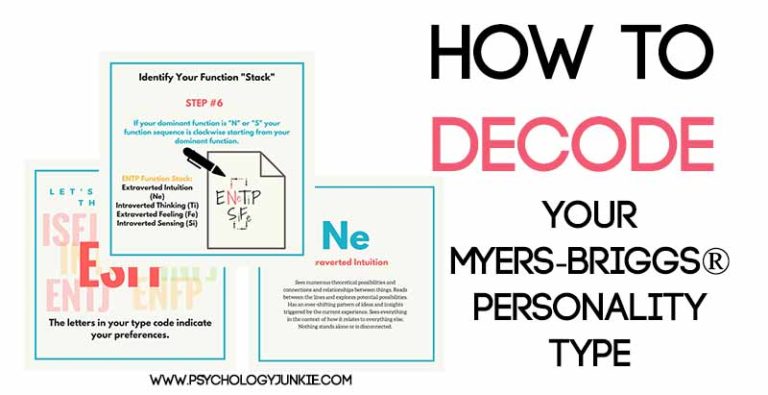
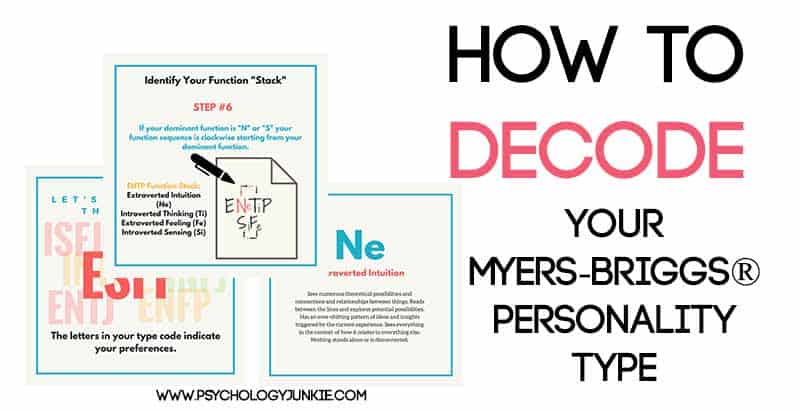









Could it be possible if i am both? First I am an INFP, the second test tells me I am INFJ. there are certain things that i possess as an infp but not with others, possessing the infj. Could i have two personalities?
I am going to try to rewrite this post soon so that it is easier to grasp. It is an extremely confusing mistype for sure! I will try to respond to your comment here when I’ve rewritten it 🙂
You might want to consider taking this test: http://www.keys2cognition.com/explore.htm. It is especially good at showing whether someone is J/P because it is based completely on cognitive functions.
I think this test helped! I’ve been having problems with some of the other online tests mostly because of the subjective nature of their phrasing.Thanks for sharing.
Hybrid ?? I have some of each
I felt as though both applied at times. I was unable to securely discern which one I was after reading the article.
Lmao i feel the same way. Maybe we are govt science experiments?
Same here. Total Hybrid? I feel ALL of it applies to me at different times. Not one thing did I think “oh that’s not me”. I’m not rigid, I don’t operate the same all the time, very fluid, different modes in different places at different times. Mind you, have been through a lot of stress for a very long time, survival mode and PTSD will make you very adaptable, hard to tell what is the true self when flexible methods of coping have been needed for decades. Funnily enough, the only definitive decider I’ve seen was a cartoon, two workers, the INFJ had everything done in the out tray with “plenty of time left”, while the INFP had little done, everything in the IN tray with “plenty of time left”. If that’s true, now I know which I am. Well, which one I’ve been operating as, who knows who I really am and how I’d be operating if I’d lived a far less stressful life.
Me too I’m very confused
This was very helpful! First time I took the MBTI test, I tested INFJ, but only with a very narrow overweight of J over P. And my Feeling function seemed to be dominant. The more I have read on the subject, the more I started to suspect that my true type is INFP, but I have been really confused about this. Especially because I’ve had difficulties making out the differences between Introverted Feeling and Introverted Intuition. This article explained the differences in a very clear way. Thank you!
As usual, this wasn’t very helpful for me. As someone else said, I seem to be both. I relate equally with both, but totally with neither. Depending on the circumstances, I can flip to either side of the coin. I’m a huge dreamer; I love thinking of what “could be”, but I’m also very much a realist. My soft heart & my logical brain constantly fight each other. I’m like Mr. Rodgers & Dr. House rolled into one! As a result, I’ve battled depression most of my life. Everything is not “black or white” for me. For example, I strive to understand & sympathize with humanity, but I’m definitely still an individualist with a very independent value system. I’ve never fit in. I’ve always been an introverted thinker, but I rarely share my thoughts or beliefs with anyone. I can also be called a “chameleon” because I want to avoid conflict or arguments. I will simply remain silent & smile politely. But I may be silently thinking how wrong someone is. So when I walk away the person will think how sweet I am, while I’m fuming inside, thinking they’re a total jerk. They would never know. I could write an entire book explaining all my similarities & differences with the 2 types, so I don’t think I’ll ever figure it out! lol
Wow you totally just described me lol!
Me too…
By your description in this comment, you sound like an INFJ to me!!
Leann French, by your description, in this comment, you sound like an INFJ to me!!
This mostly describes me, too (except the depression – sorry for that – though I’ve not always had very easy times either (some kind of social anxiety)). When you say you rarely share your beliefs and thoughts does that mean you share it with people you like and trust? Family, friends? Collegues? Because that’s what I do. (not so much with collegues though; only if it comes up and more or less only if I have to, to be honest).
Also I like avoiding conflicts and arguments, but it really depends. If somebody has an opinion and I totally disagree with it, I don’t really care having an argument. Arguing with somebody I don’t know or not very well, my heart might pound slighty faster than usual, my voice might tremble a bit, but I wanna share my opinion if I feel the need to (sometimes I even think I’m an ambivert – extrovert introvert/shy extrovert – because on the one hand I love being alone all by myself, on the other hand I love being with people – preferable with a group of people where I already know at least one person).
“So when I walk away the person will think how sweet I am, while I’m fuming inside, thinking they’re a total jerk. They would never know” – well see, I don’t think I have a pokerface like that. Depends on the situation and how much of a jerk or b*tch (sorry for the language ;)) that person is. I always try to be kind and all, but if I meet a person and their belief system or opinion totally goes against mine, there are three options:
1. I’ll say something, trying to stay respectful
2. I’ll say something – rather with my face than with my voice though
3. If it’s too much, I don’t say anthing and walk away 😉
So yeah, long story short: I still think I’m both, too.
Both of you described me! I don’t get how both of these types, if they are so different, get confused so often. I have taken numerous tests, including the one listed in this post (Infj), and half are infj and half are infp. I’m usually the planner out of my group of friends, and think about how I can bring everyone together. I enjoy being social, but after too long being with other people, I need to be alone with my thoughts and watch a movie or read a book. I love making to do lists, and like to have a loose plan with some room for spontaneity. I love reading about theories and true stories about incredible people, but prefer reading fantasy and fiction books. Sometimes I feel like I have a morbid/dark sense of humor, which confuses people. My personality was once described by a co worker as “skipping through a field of daisies.” So, there’s quite a lot of contradiction!
Yeah, I’m predominantly and INFP, but i also possess some INFJ features.
Here’s a simple way to tell which one you are: would you be okay with having a hybrid type/being both? Or do you just need to KNOW because you can only have one true type?
If you’re alright with potentially being both, you’re an INFP.
If being “both” would drive you crazy, you’re an INFJ.
It’s confusing stuff for sure, but this is a great article! Definitely nailed the key differences on the head.
-an INFJ
yes i need to know. not because i realy want to be correctly typed but i need to perfect my understanding of the concept infj and infp now i gota try and find a real life infj.
Utter garbage
I’m truly both. Every single one of these statements applies to me. I do all the things. This is why I call myself an INFX. I’m both when I’m happy and stress-free. I’m both when I’m stressed. I flip from one to the other.